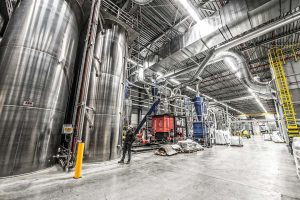
The QCP recycled plastics facility in the Netherlands is now partially owned by prime plastic producer LyondellBasell.
LyondellBasell, one of biggest plastic and chemical companies on the planet, has stepped into the plastics recycling sector for the first time. A high-level executive recently explained what drove the decision.
The Netherlands-headquartered operation announced earlier this month it has completed a transaction making it a 50-50 partner in plastics recycling company Quality Circular Polymers (QCP). The other partner is Paris-headquartered utilities and waste management giant Suez.
Founded in 2014, QCP processes recovered HDPE and PP at its plant in Sittard-Geleen, Netherlands.
With the acquisition of the 50 percent stake in QCP, LyondellBasell will begin marketing recycled resins alongside its prime plastics portfolio.
“For several years, we have been seeing an increased demand for recycled and reused products from our customers, especially in Europe,” said Richard Roudeix, LyondellBasell’s senior vice president of Olefins and Polyolefins for Europe, Asia and International. “We are intrigued by the growing conversation around the ‘circular economy’ and believe that an increased global focus on recycling presents business opportunities for our company.”
Feeling demand pull
Despite headlines about strict new plastics recycling targets and rules being formulated by the European Union, LyondellBasell’s move was driven simply by markets.
“We made the decision to acquire a stake in QCP because of the business opportunity that we believe exists in recycled and reused plastics – not because of any regulations,” Roudeix told Plastics Recycling Update. “We believe that in the future, demand will increase for both virgin materials and recycled polymers, and this joint venture allows us to expand our product offerings to our customers.”
Roudeix also noted that the ability to partner with Suez, which is already in the business of collecting and sorting recyclables, made the joint venture appealing. Suez has been involved with supplying feedstock to QCP since it opened. As part of the new joint venture, Suez will continue collecting recyclables from the region and sorting them for delivery to QCP. LyondellBasell will market the recycled plastics to its customers. The plant is located in Sittard-Geleen, in southern Netherlands, between major Belgian and German urban areas.
Roudeix described the partnership as a “competitive differentiator.”
“This joint venture is the first time that a plastics company has partnered with a leader in resource management to manufacture recycled polymer,” he said.
Before the 50-50 joint venture, Suez held a 45 percent ownership stake in QCP, managers of QCP owned 20 percent and outside investors owned 35 percent. Roudeix declined to provide financial details on LyondellBasell’s move.
When asked whether LyondellBasell expects the virgin plastics industry as a whole to move into the plastics recycling business in coming years, Roudeix said that while he can’t speak to the intent of his company’s competitors, “it is clear that the industry as a whole has focused more intensely on recycling and reusability in the past few years. Some of this conversation is driven by governments and regulators, but we have also seen increased customer demand for recycled plastics.”
Growing capabilities
QCP specializes in recycling HDPE and PP, producing two grades of HDPE and eight grades of PP copolymer. The plastics are not sold into food and beverage packaging markets.
Suez has already established end markets for QCP’s recycled plastics. For example, earlier this month, it helped bring to market a medical waste receptacle made with a QCP high-impact modified PP copolymer. It allowed Suez to offer a more sustainable container to its Dutch customers in the health care sector.
No changes in day-to-day management will take place at QCP as a result of the new ownership, Roudeix said. But the new owners will invest in expanding capacities.
When the partners announced last November they’d signed agreements to buy stakes in QCP, the facility was capable of producing 25,000 metric tons per year. The partners plan to expand that capacity to 35,000 metric tons by the end of 2018.
“We plan to continue to expand QCP’s capacity until it reaches 100,000 [metric tons] per year of material sometime in 2020,” Roudeix said.
From the facility’s launch in 2014, QCP’s founders have planned a series of expansions bringing the total capacity up to 100,000 metric tons. At the time, they estimated the cost of the full build-out at 75 million euros (about $93 million).
Suez already has deep involvement in the plastics recycling industry. The company operates nine dedicated plastics recycling facilities across Europe. Together, they produced 150,000 metric tons of recycled plastics in 2017. The company plans to boost its processing capacity by 50 percent by 2020.
In the future, LyondellBasell will continue to use sustainability as one of several criteria for evaluating investment decisions, Roudeix said.
“We view this as a great first step in this space,” Roudeix said. “We believe that interest in the circular economy and potentially the demand for recycled materials will continue to grow, which could create more opportunities for us in the future.”
Photo credit: ERMINDO ARMINO
More stories about markets
- Bale pricing bucks seasonal trend, trade alliances shift
- Trex, Mohawk, Indorama report Q1 earnings
- Haulers share how weather, tariffs impacted Q1